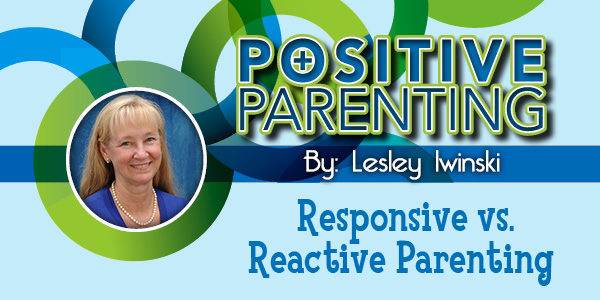Responsive vs. Reactive Parenting
When you find yourself frequently “reacting” to your children’s behavior, your “fight, flight, freeze or faint” response is being triggered. You are at risk for chronic stress and your mental and physical health can suffer. When you aren’t at your best, it is harder for your children to be at theirs.
Before you are about to blow, push your invisible “Pause Button.” Take a deep breath or step away to calm yourself. Then decide what you want your child to learn that will serve her well when she is older.
Choose to respond in a helpful way instead of reacting. Remember that mistakes are just that: unintended accidents. Ask your child:
- What did you learn?
- What will you do differently next time?
- Is there anything you can do to make things right?
Here are some examples:
1) Bobby knocks his cup off the table with his elbow.
Reaction: “For crying out loud! Look at that mess! You’re so clumsy!”
Response: “Uh-oh! Here is a towel. I’ll help you clean it up.”
Once the milk is cleaned up, ask, “What did you learn about putting your cup on the edge of the table?” “Not to.”
Smile and nod. “That’s right. So, what will you do differently next time?” “Put it behind my plate.” “Good idea! Thank you for helping clean up. Let’s try again with this cup.”
2) Ashley throws a ball that knocks over a lamp and breaks it.
Reaction: “What have I told you about throwing a ball in the house? Go to your room and don’t come down till I tell you!!”
Response: Get close and gently ask, “What did you learn there?” “Not to throw the ball in the house?” “That’s right. Now you understand why we have that rule.
What can you do differently so we don’t lose any more lamps?” “Only throw the ball outside?” “That’s sounds like a great plan. Can you remember?” “Yes!”
Then, help Ashley clean it up. Allow her to be part of the solution either helping to repair the lamp or contributing part of her allowance toward replacing it. She might also offer to do some special jobs to make up for breaking it.
Yes, it takes more time to choose a helpful response and implement these changes. The payoff is a more peaceful, less stressed family.
You are helping your child learn not to fear her mistakes, to accept responsibility and to be willing to make things right.
She learns to recognize what she needs, and she finds healthy ways to ask for help when she needs it.
Because you act with respect, children learn how to be respectful. The empathy you offer them helps them to learn empathy for others.
That’s something worth pausing for!
Dr. Lesley Iwinski is the mother of three grown children, a family physician and owner of Growing Peaceful Families, LLC. She offers classes, workshops and seminars.
Info: (859) 333-3053 or www.growingpeacefulfamilies.com.

